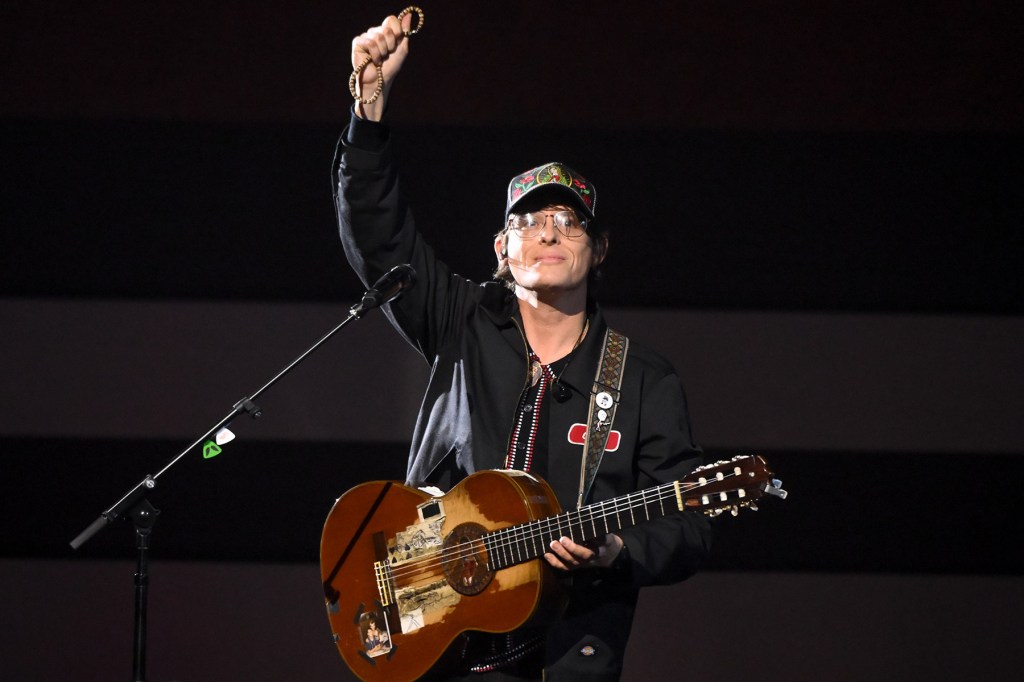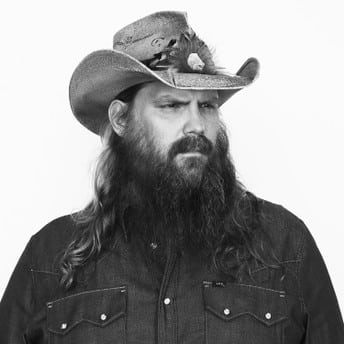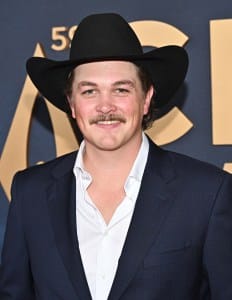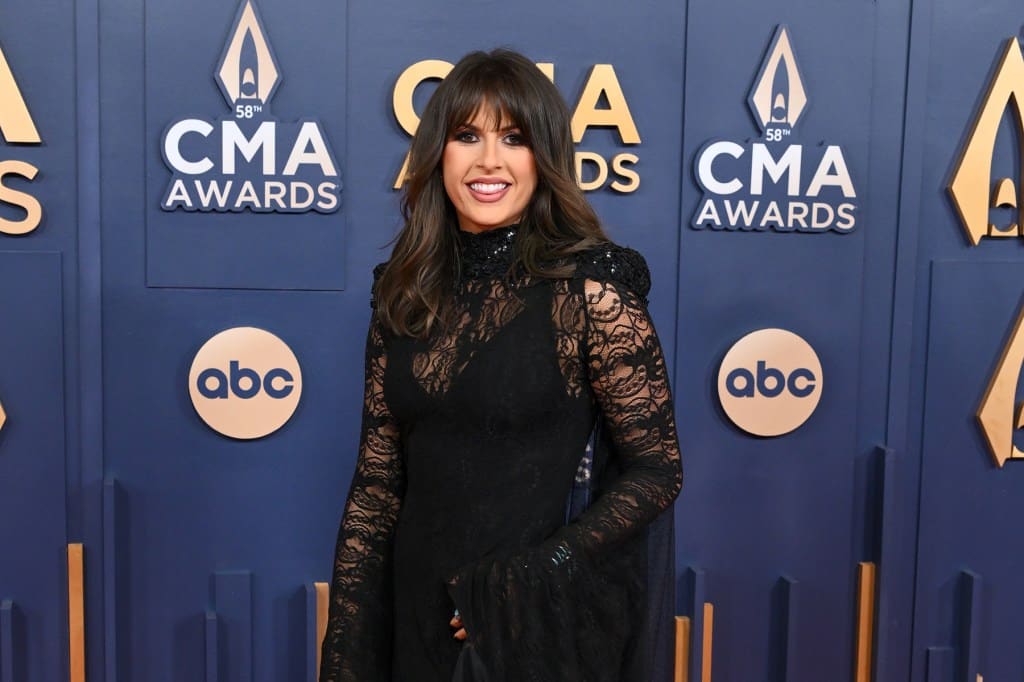Awards
Page: 4
Trending on Billboard The 2025 CMA Awards took over Nashville’s Bridgestone Arena on Wednesday (Nov. 19) night for the 59th annual edition of the Country Music Association’s annual awards show. Explore See latest videos, charts and news But when Chris Stapleton and Miranda Lambert took the stage to perform their duet “A Song to Sing,” […]
Trending on Billboard
Shaboozey and Stephen Wilson Jr. took the CMA Awards audience on an emotional walk Wednesday night (Nov. 19).
Standing on a set made to look like a lush field of wheat at dusk, both country stars’ voices sounded raw and gorgeous over an emotional accompaniment provided by the band on stage with them. ‘Boozey and Wilson took turns singing verses before joining together at the end, crooning, “So let’s stay out here for a while, my friend/ Let’s stay and walk the line ’til the end/ I know you’re tired, hell, so am I/ We can’t take the same road again.”
The ballad was featured in this year’s film adaptation of Stephen King’s The Long Walk, a harrowing tale about a dystopian society in which a selection of young men enter an annual contest in the hopes of winning fame and fortune, which they can only secure after outliving the rest of the competitors on a days-long walk across the country. “I feel so excited,” ‘Boozey told Billboard on the CMAs red carpet shortly before the show. “I think it’s going to be a really special performance, doing it with my boy.”
“Took a Walk” wasn’t the only performance Wilson delivered Wednesday night. Shortly before taking the stage with his duet partner, he did a solo, stripped-down rendition of Ben E. King’s “Stand By Me” for the crowd at Bridgestone Arena in Nashville.
Have you played Billboard’s “A Little Bit Country” Crossword?Play now!
Also speaking to Billboard before the ceremony, Wilson explained how his two performances were linked. “I’m a big Stephen King fan,” he said. “I play this song called ‘Stand By Me,’ which I’m playing tonight as well, because of a movie called Stand By Me based off a Stephen King [story called The Body]. It’s been haunting me my whole life.”
“Fast-forward these years later, I get invited to sing this song and write this song with Shaboozey for a Stephen King movie called The Long Walk,” he added on the carpet. “The world is weird, life is weird and I’m just here for it.”
Both stars were nominated for the same award this year, receiving nods for new artist of the year. The prize ultimately went to Zach Top.
The ceremony comes as Shaboozey is working on a new album. In October, he exclusively told Billboard, “[It’s about] feminism, I’ll say that.”
“Femininity is probably the best word I can use,” he added at the time of the upcoming full-length, which he says is just about finished. “There’s a story there … It’s a Western concept album about femininity — I shouldn’t have told you that!”

It’s safe to say anyone who hits the stage at the CMA Awards has seriously lived some life, but Stephen Wilson Jr. might have ‘em all beat at least in terms of strange paths to the country spotlight.
The Indiana-born Wilson has been a boxer, competing in the Golden Gloves of America amateur competition; 10 years ago, he was wearing a lab coat and working as a microbiologist; not long after that, he became a songwriter in Nashville, signed to Big Loud. But following the death of his comparatively extroverted father in 2018, something changed, and he began to warm up to the idea of stepping into his own spotlight. His debut album, søn of dad, dropped this year, and although he skews country, he’s covered everyone from Nirvana to Smashing Pumpkins.
Have you played Billboard’s “A Little Bit Country” Crossword?Play now!
At the 2025 CMA Awards on Wednesday (Nov. 19) night, Wilson appeared on stage, wearing mostly black but rocking a floral ball cap with the Virgin Mary on it. In his firm, raspy tone, Wilson slowly but surely captivated the Bridgestone Arena with a soul-rending cover of Ben E. King’s “Stand By Me.”
Ahead of his performance of “Stand By Me,” which turned heads when he brought it to the Atlanta-based YouTube series Live at the Print Shop in Oct. 2024, Wilson spoke to Billboard correspondents on the CMA Awards red carpet and explained how the 1986 film of the same name influenced his decision to trot out this iconic song.
“I’m a big Stephen King fan,” Wilson told Billboard. “I play this song called ‘Stand By Me,’ which I’m playing tonight as well, because of a movie called Stand By Me based off a Stephen King [story called The Body]. It’s been haunting me my whole life. I started playing this song after my dad died to kinda bring him back. I turned it into a hymn for me. And then fast-forward these years later, I get invited to sing this song and write this song with Shaboozey for a Stephen King movie called The Long Walk and here we are playing both of those songs. The world is weird, life is weird and I’m just here for it.”
Later in the evening, Wilson joined Shaboozey to perform that song, “Took a Walk,” on the CMA Awards stage, too.
Check out Billboard’s interview with Stephen Wilson Jr. on the CMA Awards red carpet below.
Trending on Billboard With 20 studio albums under his belt, country superstar Kenny Chesney had plenty of songs to choose from for his performance at the 2025 CMA Awards — so many, in fact, that he couldn’t pick just one. Hopping on stage at Nashville’s Bridgestone Arena, Chesney was introduced by host Lainey Wilson, who […]
Trending on Billboard Zach Top didn’t need anyone to hold his beer when he won big at the Country Music Association Awards on Wednesday night (Nov. 19) — he just took it right on up with him. Shortly after performing on stage at Bridgestone Arena in Nashville, the 28-year-old singer-songwriter was crowned new artist of […]

Trending on Billboard Following a Luke Combs performance of “Back in the Saddle,” host Lainey Wilson properly kicked off the 2025 CMA Awards, with a medley of country favorites originally performed by some of the stars in the Nashville crowd. After some introductory remarks about how excited she was to be hosting the awards and […]
Trending on Billboard When it came time to kick off the 2025 CMA Awards on Wednesday night (Nov. 19), Luke Combs didn’t waste any time — he just hopped “Back in the Saddle.” Taking to the stage at Bridgestone Arena in Nashville, Combs — dressed in his usual short-sleeved button-up shirt and baseball cap — […]
Trending on Billboard The 2025 CMA Awards are going down Wednesday night (Nov. 19) live from Nashville’s Bridgestone Arena, and the biggest and brightest stars in country music are all coming to the party. Ella Langley, Megan Moroney and Lainey Wilson lead the way in nominations, tied with six nods apiece. Zach Top follows with […]
Trending on Billboard
It’s officially ladies’ night at the 2025 CMA Awards on Wednesday (Nov. 19), with Ella Langley, Megan Moroney and Lainey Wilson entering the night as the top nominees with six nods apiece.
In fact, Langley nabbed one of the early CMA Awards, taking home music video of the year for her Riley Green collab “You Look Like You Love Me” — a video she co-directed with John Park and Wales Toney.
But who will take home the other prizes? The 59th annual CMA Awards are broadcasting live tonight from Nashville’s Bridgestone Arena, 8 to 11 p.m. ET on ABC, and you can follow along with Billboard for the complete winners list below.
Entertainer of the Year
Luke Combs
Cody Johnson
Chris Stapleton
Morgan Wallen
Lainey Wilson
Single of the Year
Award goes to Artist(s), Producer(s) and Mix Engineer(s)
“4x4xU” – Lainey Wilson; Producer: Jay Joyce; Mix Engineers: Jason Hall, Jay Joyce
“Ain’t No Love in Oklahoma” – Luke Combs; Producers: Luke Combs, Chip Matthews, Jonathan Singleton; Mix Engineer: Chip Matthews
“Am I Okay?” – Megan Moroney; Producer: Kristian Bush; Mix Engineer: Justin Niebank
“I Never Lie” – Zach Top; Producer: Carson Chamberlain; Mix Engineer: Matt Rovey
“You Look Like You Love Me” – Ella Langley & Riley Green; Producer: Will Bundy; Mix Engineer: Jim Cooley
Album of the Year
Award goes to Artist, Producer(s) and Mix Engineer(s)
Am I Okay? – Megan Moroney; Producer: Kristian Bush; Mix Engineer: Justin Niebank
Cold Beer & Country Music – Zach Top; Producer: Carson Chamberlain; Mix Engineer: Matt Rovey
F-1 Trillion – Post Malone; Producers: Louis Bell, Charlie Handsome, Hoskins; Mix Engineer: Ryan Gore
I’m the Problem – Morgan Wallen; Producers: Jacob Durrett, Charlie Handsome, Joey Moi; Mix Engineers: Charlie Handsome, Joey Moi
Whirlwind – Lainey Wilson; Producer: Jay Joyce; Mix Engineers: Jason Hall, Jay Joyce
Song of the Year
Award goes to Songwriter(s)
“4x4xU”; Songwriters: Jon Decious, Aaron Raitiere, Lainey Wilson
“Am I Okay?”; Songwriters: Jessie Jo Dillon, Luke Laird, Megan Moroney
“I Never Lie”; Songwriters: Carson Chamberlain, Tim Nichols, Zach Top
“Texas” ; Songwriters: Johnny Clawson, Josh Dorr, Lalo Guzman, Kyle Sturrock
“You Look Like You Love Me”; Songwriters: Riley Green, Ella Langley, Aaron Raitiere
Female Vocalist of the Year
Kelsea Ballerini
Miranda Lambert
Ella Langley
Megan Moroney
Lainey Wilson
Male Vocalist of the Year
Luke Combs
Cody Johnson
Chris Stapleton
Zach Top
Morgan Wallen
Vocal Group of the Year
Lady A
Little Big Town
Old Dominion
Rascal Flatts
The Red Clay Strays
Vocal Duo of the Year
Brooks & Dunn
Brothers Osborne
Dan + Shay
Maddie & Tae
The War And Treaty
Musical Event of the Year
Award goes to Artists and Producer(s)
“Don’t Mind If I Do” – Riley Green (featuring Ella Langley); Producers: Scott Borchetta, Jimmy Harnen, Dann Huff
“Hard Fought Hallelujah” – Brandon Lake with Jelly Roll; Producer: Micah Nichols
“I’m Gonna Love You” – Cody Johnson (with Carrie Underwood); Producer: Trent Willmon
WINNER: “Pour Me a Drink” – Post Malone (feat. Blake Shelton); Producers: Louis Bell, Charlie Handsome
“You Had To Be There” – Megan Moroney (feat. Kenny Chesney); Producer: Kristian Bush
Musician of the Year
Jenee Fleenor – Fiddle
Paul Franklin – Steel Guitar
Brent Mason – Guitar
Rob McNelley – Guitar
Derek Wells – Guitar
Music Video of the Year
Award goes to Artist(s) and Director(s)
“Am I Okay?” – Megan Moroney; Directors: Alexandra Gavillet, Megan Moroney
“I’m Gonna Love You” – Cody Johnson (with Carrie Underwood); Director: Dustin Haney
“Somewhere Over Laredo” – Lainey Wilson; Director: TK McKamy
“Think I’m In Love With You” – Chris Stapleton; Director: Running Bear
WINNER: “You Look Like You Love Me” – Ella Langley & Riley Green; Directors: Ella Langley, John Park, Wales Toney
New Artist of the Year
Ella Langley
Shaboozey
Zach Top
Tucker Wetmore
Stephen Wilson Jr.
CMA Broadcast Awards winners will be determined by a final round of judging this month. Entries are judged by a panel of broadcast professionals, representing all market sizes and regions. The winners were revealed on Tuesday Oct. 7. Recipients will be celebrated at the CMA Awards.
Broadcast Personality of the Year (by market size):
Weekly National
WINNER: “Country Countdown USA with Lon Helton” (Lon Helton) – LH Productions
“The Country Top 40 With Fitz” (Cory “Fitz” Fitzner) – Hubbard Broadcasting
“The Original Country Gold” (Rowdy Yates) – Syndicated Media
“Today’s Country Radio” (Kelleigh Bannen) – Apple Music Radio
“Y’all Access with Kelly Sutton” (Kelly Sutton) – Compass Media Group
Daily National
“Big D & Bubba” (“Big D” Derek Haskins, “Bubba” Sean Powell, Carsen Humphreville, Jonathan Shaffer, and Garrett Freche) – Silverfish Media
“Highway Mornings With Cody Alan” (Cody Alan and Lauryn Snapp) – SiriusXM
“Ridin’ With Rowdy” (Rowdy Yates) – SuiteRadio / RFC Media
WINNER: “The Rob and Holly Show” (Rob Stone and Holly Hutton) – Audacy
“Wilhite and Wall Show” (Darren Wilhite and Tim Wall) – Ebert Productions
Major Market
WINNER: “Chris Carr & Company” (Chris Carr, Sam Sansevere, and “Dubs” Michael Wilczynski) – KEEY, Minneapolis-St. Paul, Minn.
“Hawkeye and Michelle” (“Hawkeye” Mark Louis Rybczyk and Michelle Rodriguez) – KSCS, Dallas-Ft. Worth, Texas
“The Lo Show” (Lauren “Lo” Barker) – KKBQ, Houston
“Rachel Ryan” (Rachel Ryan) – KSCS, Dallas-Ft. Worth, Texas
“The Scotty Kay Show” (Scotty Kay) – WUSN, Chicago
Large Market
“Deb & Matt in the Morning” (Deborah Honeycutt and Matt Malone) – WFMS, Indianapolis, Ind.
WINNER: “The Q Morning Crew w/ Mike & Amanda” (Mike Wheless and Amanda Daughtry) – WQDR, Raleigh-Durham, N.C.
“Scott and Shannen” (Scott Dolphin and “Shannen O” Oesterreich) – WMIL, Milwaukee, Wis.
“Tim & Chelsea” (Tim Leary and Chelsea Taylor) – WIRK, West Palm Beach-Boca Raton, Fla.
“Wayne D and Tay” (“Wayne D” Danielson and Tay Hamilton) – WSIX, Nashville
Medium Market
“The Doc Show with Chewy” (Ken “Doc” Medek and Sean “Chewy” Medek) – WGGY, Wilkes Barre-Scranton, Pa.
“Ellis and Bradley Show” (Bill Ellis and Beth Bradley) – WSSL, Greenville-Spartanburg, S.C.
“Joey & Nancy” (Joey Tack, Nancy Barger, and Karly Duggan) – WIVK, Knoxville, Tenn.
WINNER: “Mo & StyckMan” (Melissa “Mo” Wagner and Greg “StyckMan” Owens) – WUSY, Chattanooga, Tenn.
“Spencer Graves Show” (Spencer Graves, Megan Terry, and Blair Davis) – WDXB, Birmingham, Ala.
Small Market
WINNER: “Ben & Arnie” (Ben Butler and Arnie Andrews) – WCOW, La Crosse, Wis.
“Brent Lane and The Cat Pak Morning Show” (Brent Lane and Jordan Glass) – WYCT, Pensacola, Fla.
“Dan Austin Show” (Dan Austin) – WQHK, Fort Wayne, Ind.
“Hilley & Hart” (Kevin Hilley and Erin Hart) – KATI, Columbia, Mo.
“Liz & Scotty in the Morning” (Liz Del Grosso and Scotty Cox) – KCLR, Columbia, Mo.
Radio Station of the Year (by market size):
Major Market
WINNER: KKBQ – Houston
KSCS – Dallas-Ft. Worth, Texas
KYGO – Denver-Boulder, Colo.
WUSN – Chicago
WXTU – Philadelphia
Large Market
WCTK – Providence-Warwick-Pawtucket, R.I.
WMIL – Milwaukee-Racine, Wis.
WSIX – Nashville
WINNER: WUBE – Cincinnati
WWKA – Orlando, Fla.
Medium Market
KUZZ – Bakersfield, Calif.
WHKO – Dayton, Ohio
WINNER: WIVK – Knoxville, Tenn.
WLFP – Memphis, Tenn.
WQMX – Akron, Ohio
Small Market
KATI – Columbia, Mo.
KCLR – Columbia, Mo.
WCOW – La Crosse, Wis.
WKML – Fayetteville, N.C.
WINNER: WXBQ – Johnson City-Kingsport-Bristol, Tenn.-Va.

Trending on Billboard
Few phrases define the year in music and culture like Moliy’s scintillating directive to “shake it to the max.” The Ghanaian singer’s sultry voice reverberated across the globe, blending her own Afropop inclinations with Jamaican dancehall-informed production, courtesy of Miami-based duo Silent Addy and Disco Neil. Originally released in December 2024, Moliy’s breakthrough global crossover hit ascended to world domination, peaking at No. 6 on the Global 200, thanks to a remix featuring dancehall superstars Shenseea and Skillibeng. Simply put, “Max” soundtracked a seismic moment in African and Caribbean music in 2025.
Given its blockbuster success, “Shake It to the Max” was widely expected to be a frontrunner in several categories at the 2026 Grammys. In fact, had the song earned a nomination for either best African music performance or best global music performance, many forecasters anticipated a victory. So, when “Shake It to the Max” failed to appear on the final list of 2026 Grammy nominees in any category earlier this month (Nov. 7), listeners across the world were left scratching their heads — none more than gamma. CEO Larry Jackson.
“It pains me to have to acknowledge this, because Harvey Mason, Jr. is a longtime personal friend, and I also don’t attribute any of this directly to him,” Jackson tells Billboard in an exclusive statement. “But I found it to be deeply disappointing that [the Recording Academy] subjectively chose to disqualify Moliy’s “Shake It to the Max (Fly)” remix – one of the biggest songs in the world this year – from the Best Global Music Performance and African Music categories.”
The “Shake It to the Max” remix arrived within the 2026 Grammys eligibility period on Feb. 21, with new verses from Shenseea and Skillibeng, and a revised intro from Moliy, which satisfies the Recording Academy’s definition of a “new recording.” As per the 68th Grammy Awards Rules & Guidelines, “new recordings” are defined as material that has been recorded within five years of the release date.
Beyond the performance and production criteria, the “Max” remix also holds a unique ISRC (International Standard Recording Code), a globally recognized digital identifier assigned to distinct sound recordings and music videos, confirming it as its own distinct master recording. The remix is also the only version of “Max” that has ever been submitted for Grammy consideration, which complies with the Recording Academy’s rule that “only one version/mix of a recording is eligible in the GRAMMY process in any year.”
Due to its fusion of Ghanaian Afropop and Jamaican dancehall, gamma. submitted the “Shake It to the Max” remix for consideration in the best global music performance category. On Sept. 20, the Recording Academy notified the Jackson-founded label that the song was deemed ineligible in that category but remained eligible for best music video and song and record of the year. The Academy did not allow the “Max” remix to compete in a different genre category, despite compelling arguments for the song fitting within the parameters of pop, melodic rap or African music.
“It really is unfortunate that ‘Shake It to the Max’ isn’t eligible in the best African music performance and best global music performance categories this year,” the Recording Academy says in an exclusive statement to Billboard. “We all acknowledge it is a massive song with significant cultural impact. Unfortunately, but quite simply, it was submitted as a remix, and as per our longstanding and published rules, remixes are just not eligible in these categories. Regardless, our goal is always to honor, respect and fairly represent creators and the music they make — so we will keep working to improve our entry processes and eligibility guidelines.”
According to gamma., the Recording Academy notified the label of the song’s ineligibility on Sept. 20. The gamma. team tried to appeal the decision from Sept. 20-26, looping in Jackson on Oct. 1 — who then notified Mason Jr. on Oct. 2, the day before first-round voting began.
“To be disqualified because we decided to call it a remix instead of ‘Part Two’ in our submission process is an interesting choice,” Jackson says. “This is especially odd, given the fact that 50% of it is a new composition… The answer of ‘That’s just the way we do things, and that’s just the rule’ doesn’t feel respectful toward what these artists achieved.”
In addition to topping U.S. Afrobeats Songs (26 weeks), Rhythmic Airplay and World Digital Song Sales, the “Max” remix also reached the top 10 on R&B/Hip-Hop Airplay (No. 8), helping the song reach No. 44 on the Billboard Hot 100 — one of the best showings for a 2020s dancehall track on Billboard’s marquee singles ranking. Crowned one of the defining songs of the summer by Spotify, “Max” also garnered remixes from Sean Paul, Major Lazer and more major artists.
Notably, “Shake It to the Max” is not the first time a global crossover collaboration — even one initially dubbed a remix — lit up the nominations ballot. Luis Fonsi and Daddy Yankee’s “Despacito,” which received a Justin Bieber remix three months after the release of the original, earned nominations for best pop duo/group performance and record and song of the year at the 2018 Grammys, ultimately losing all three. The word “remix” does not appear in the title of “Despacito” on any publicly available GRAMMY-related documents or media, despite appearing in the song’s title across DSPs. A similar naming convention was utilized for Ariana Grande’s “The Boy Is Mine.” On DSPs, the Grammy-nominated version of the song featuring Brandy and Monica includes the word “remix” in the title.
There is also a Grammy category specifically for remixes. The best remixed recording category honors “remixed recordings (‘remixes’) where the remixer takes previously recorded and released material and creatively adds to, alters or transforms it in such a way as to create a new and unique performance.” The 68th Grammy Awards Rules & Guidelines also state that “the addition of a vocal performance by a featured artist without substantive change to the original music recording is not eligible as a remix.” The Skillibeng and Shenseea-assisted “Max” remix does not substantively change the music of the original track beyond the addition of new vocal performances by featured artists, so it would not have been eligible to compete in this category.
“How symbolically discouraging is it for up-and-coming artists from Africa or the Caribbean that such an undeniable global success may have a likelihood of not being honored by the Academy in the future because of rigid conventionalism,” Jackson continues. “The concept of it all is at best devoid of any common sense or any fluidity in thought, and at [worst], screams the lack of leverage that independent artists and independent music companies systematically have against the machine.”
Moliy signed to gamma., a fast-growing independent media company rivaling major labels in areas like music distribution, in 2024. At the 2026 Grammys, hundreds of indie artists will compete for golden gramophones, including Durand Bernarr, Destin Conrad and Shaboozey — though they’re still in the minority in the ceremony’s biggest categories compared to artists on majors.
Despite two global smashes in “Max” and Full Blown & Yung Bredda’s “The Greatest Bend Over” this year, Caribbean music continues to be sidelined at the Grammys. While this year’s all-Jamaica best reggae album lineup is cause for celebration (non-Caribbean winners have courted controversy as recently as 2022), the region’s myriad culture-driving, arena-headlining sounds (soca, konpa and bouyon, chief among them) remain overlooked.
Even though “Max” will not get the chance to compete for a Grammy, hopefully its absence at the 2026 ceremony encourages the Academy to fine-tune their rules regarding remix submissions — and better serve and honor Caribbean artists and music.

 State Champ Radio
State Champ Radio 



